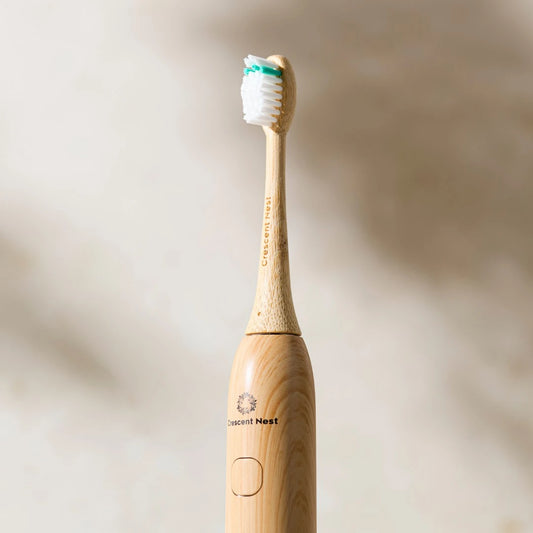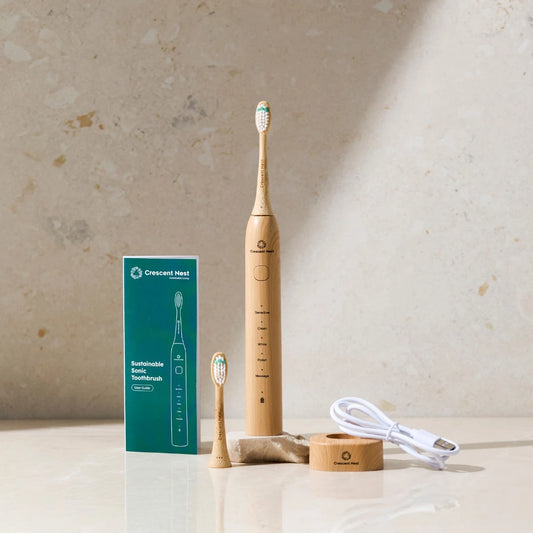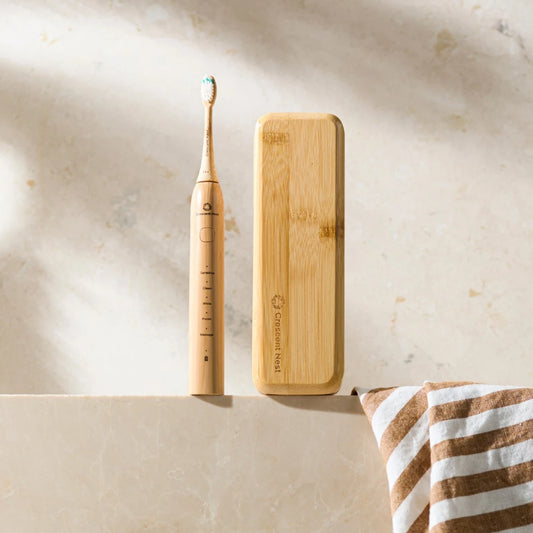
Could Your Toothbrush Protect Your Brain?
Share
When most people think about dementia prevention, brushing their teeth rarely tops the list. Yet a landmark 2024 study in Scientific Reports followed 7,384 Japanese adults aged 75+ and found that poor swallowing function, often a sign of declining oral health raised the odds of developing dementia by 48 percent over just two years.¹ Coupled with earlier research showing links between tooth loss, gum disease and cognitive decline, the message is clear: protecting your mouth can help protect your mind.
1. What the researchers found
|
Oral-function test |
Result over 2 years |
Risk after adjusting for age, habits & illnesses |
|
Swallowing ability |
6 % of participants developed dementia |
+48 % higher risk with poor swallowing |
|
Chewing ability |
No significant link once other factors controlled |
— |
|
Tongue-and-lip speed |
No significant link |
— |
Why swallowing matters: Impaired swallowing may cut blood flow to the brain or signal early neurological changes, both of which can speed up cognitive decline.
2. Why Oral Health and Brain Health Are Connected
- Reduced Nutrition – Tooth loss or pain limits crunchy fruit and veg, starving the brain of antioxidants and polyphenols.
- Chronic Inflammation – Gum infection releases inflammatory molecules that travel through the bloodstream and can damage neurons.
- Sensory Stimulation – Chewing activates nerves linked to the hippocampus, the brain’s memory hub. Fewer teeth = less stimulation.
3. Daily Habits That Cut Dementia Risk
|
Habit |
Brain-health benefit |
How to make it stick |
|
Brush twice a day |
Removes plaque that fuels inflammation |
Use a sustainable electric toothbrush with a two-minute timer |
|
Replace brush heads every 3 months |
Worn bristles miss plaque and injure gums |
Our bamboo brush heads snap on and compost easily |
|
Clean between teeth daily |
Breaks up bacteria colonising the gum line |
Floss or use a water flosser at night |
|
Schedule dentist visits twice a year |
Early treatment prevents extractions |
Book next appointment before leaving the clinic |
|
Address swallowing or dry-mouth issues promptly |
Maintains healthy oral function |
Speak to your dentist or GP at the first sign |
4. How Crescent Nest Supports Whole-Mouth Wellness
- Bamboo Sonic Toothbrush – Up to 40,000 gentle sonic vibrations per minute for superior plaque removal with 90 % less plastic.
- Care⁺ Plan Subscription – Fresh heads delivered every quarter, lifetime repair guarantee, and zero-hassle recycling guidance.
- Planet-Positive – Every purchase plants a tree through our One Tree Planted partnership, good for you and the Earth.
5. FAQs
Does losing teeth really raise dementia risk?
Yes. Meta-analyses covering more than 300,000 people show a consistent association. Tooth loss isn’t destiny, but it’s a measurable risk factor you can influence.
Will implants or dentures reduce that risk?
Restoring chewing strength helps, but implants don’t cancel the need for meticulous daily cleaning around the gum line.
Is an eco-friendly electric toothbrush as effective as mainstream brands?
Absolutely. Our sustainable electric toothbrush delivers clinically proven sonic cleaning while sending far less plastic to landfill.
Key Takeaways
- Poor swallowing function and tooth loss predict faster cognitive decline.
- Daily plaque control and regular dental check-ups protect both mouth and mind.
- Switching to an eco friendly electric toothbrush with compostable heads is a simple, science-backed upgrade to your routine.
Ready to brush smarter? Explore the Crescent Nest Bamboo Sonic Toothbrush and give your smile and your brain a healthier future.
________________________________________
¹ Iwai K, Azuma T, Yonenaga T, et al. “Longitudinal association of oral functions and dementia in Japanese older adults.” Scientific Reports. 2024;14:5858.
This article is for educational purposes and does not replace professional medical advice. If you notice changes in chewing or swallowing, consult a health professional.



